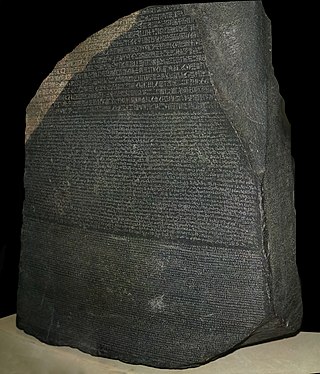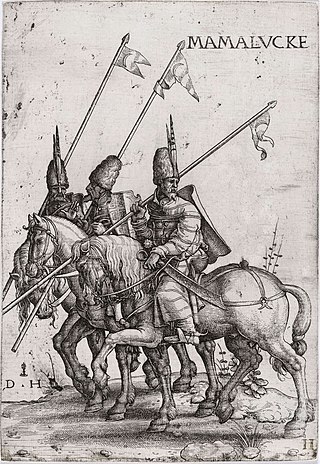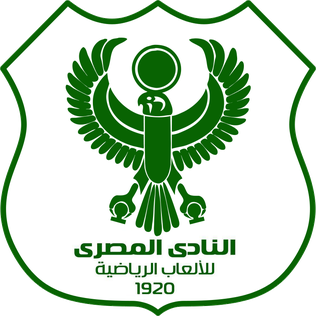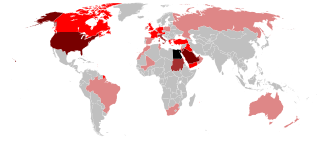
Alexandria is the second largest city in Egypt and the largest city on the Mediterranean coast. It lies at the western edge of the Nile River delta. Founded in c. 331 BC by Alexander the Great, Alexandria grew rapidly and became a major centre of Hellenic civilisation, eventually replacing Memphis, in present-day Greater Cairo, as Egypt's capital. Called the "Bride of the Mediterranean" internationally, Alexandria is a popular tourist destination and an important industrial centre due to its natural gas and oil pipelines from Suez.

Cairo is the capital of Egypt and the Cairo Governorate, and is the country's largest city, being home to more than 10 million people. It is also part of the largest urban agglomeration in Africa, the Arab world and the Middle East. The Greater Cairo metropolitan area is the 12th-largest in the world by population with over 22.1 million people.

The Great Pyramid of Giza is the largest Egyptian pyramid. It served as the tomb of pharaoh Khufu, who ruled during the Fourth Dynasty of the Old Kingdom. Built c. 2600 BC, over a period of about 27 years, the pyramid is the oldest of the Seven Wonders of the Ancient World, and the only wonder that has remained largely intact. It is the most famous monument of the Giza pyramid complex, which is part of the UNESCO World Heritage Site "Memphis and its Necropolis". It is situated at the northeastern end of the line of the three main pyramids at Giza.

The Rosetta Stone is a stele of granodiorite inscribed with three versions of a decree issued in 196 BC during the Ptolemaic dynasty of Egypt, on behalf of King Ptolemy V Epiphanes. The top and middle texts are in Ancient Egyptian using hieroglyphic and Demotic scripts, respectively, while the bottom is in Ancient Greek. The decree has only minor differences across the three versions, making the Rosetta Stone key to deciphering the Egyptian scripts.

Egyptian hieroglyphs were the formal writing system used in Ancient Egypt for writing the Egyptian language. Hieroglyphs combined ideographic, logographic, syllabic and alphabetic elements, with more than 1,000 distinct characters. Cursive hieroglyphs were used for religious literature on papyrus and wood. Later, the hieratic and demotic scripts were derived from hieroglyphs by Egyptian scribes. The Proto-Sinaitic script, adapted to write the Canaanite languages instead of Egyptian, was also derived from hieroglyphs, and later evolved into the Phoenician alphabet, the first widely adopted phonetic writing system. Moreover, owing in large part to the Greek and Aramaic scripts that descended from Phonetician, the majority of the world's living writing systems are descendants of Egyptian hieroglyphs—most prominently the Latin and Cyrillic scripts through Greek, and the Arabic and Brahmic scripts through Aramaic.

The Fatimid Caliphate or Fatimid Empire was a caliphate extant from the tenth to the twelfth centuries CE under the rule of the Fatimids, an Isma'ili Shia dynasty. Spanning a large area of North Africa and West Asia, it ranged from the western Mediterranean in the west to the Red Sea in the east. The Fatimids trace their ancestry to the Islamic prophet Muhammad's daughter Fatima and her husband Ali, the first Shia imam. The Fatimids were acknowledged as the rightful imams by different Isma‘ili communities as well as by denominations in many other Muslim lands and adjacent regions. Originating during the Abbasid Caliphate, the Fatimids initially conquered Ifriqiya. They extended their rule across the Mediterranean coast and ultimately made Egypt the center of the caliphate. At its height, the caliphate included—in addition to Egypt—varying areas of the Maghreb, Sicily, the Levant, and the Hejaz.

Mamluk or Mamaluk were non-Arab, ethnically diverse enslaved mercenaries, slave-soldiers, and freed slaves who were assigned high-ranking military and administrative duties, serving the ruling Arab and Ottoman dynasties in the Muslim world.

Port Said is a city that lies in northeast Egypt extending about 30 km (19 mi) along the coast of the Mediterranean Sea, straddling the west bank of the northern mouth of the Suez Canal. The city is the capital of the Port Said governorate and it forms the majority of the Governorate, where its seven districts comprise seven of the governorate's eight regions. The city was established in 1859 during the building of the Suez Canal, and at the beginning of 2023 had a population of 680,375 people.

Egyptian Arabic, locally known as Colloquial Egyptian, or simply Masri (مَصرى), is the most widely spoken vernacular Arabic variety in Egypt. It is part of the Afro-Asiatic language family, and originated in the Nile Delta in Lower Egypt. The estimated 100 million Egyptians speak a continuum of dialects, among which Cairene is the most prominent. It is also understood across most of the Arabic-speaking countries due to broad Egyptian influence in the region, including through Egyptian cinema and Egyptian music. These factors help to make it the most widely spoken and by far the most widely studied variety of Arabic.

Fustat, also Fostat, was the first capital of Egypt under Muslim rule, and the historical centre of modern Cairo. It was built adjacent to what is now known as Old Cairo by the Rashidun Muslim general 'Amr ibn al-'As immediately after the Muslim conquest of Egypt in AD 641, and featured the Mosque of Amr, the first mosque built in Egypt.

Abū Tamīm Maʿad al-Mustanṣir biʾllāh was the eighth Fatimid Caliph from 1036 until 1094. He was one of the longest reigning Muslim rulers. His reign was the twilight of the Fatimid state. The start of his reign saw the continuation of competent administrators running the Fatimid state, overseeing the state's prosperity in the first two decades of al-Mustansir's reign. However, the break out of court infighting between the Turkish and Berber/Sudanese court factions following al-Yazuri's assassination, coinciding with natural disasters in Egypt and the gradual loss of administrative control over Fatimid possessions outside of Egypt, almost resulted in the total collapse of the Fatimid state in the 1060s, before the appointment of the Armenian general Badr al-Jamali, who assumed power as vizier in 1073, and became the de facto dictator of the country under the nominal rule of al-Mustansir.

Shajar al-Durr, also Shajarat al-Durr, whose royal name was al-Malika ʿAṣmat ad-Dīn ʾUmm-Khalīl Shajar ad-Durr, was a ruler of Egypt. She was the wife of As-Salih Ayyub, and later of Izz al-Din Aybak, the first sultan of the Mamluk Bahri dynasty. Prior to becoming Ayyub's wife, she was a child slave and Ayyub's concubine.

Al Jazeera English is a 24-hour English-language news channel operating under Al Jazeera Media Network, which is partially funded by the government of Qatar. In a bid to broaden its reach, Al Jazeera introduced an English-language division in 2006. It is the first global English-language news channel to be headquartered in the Middle East.

The General Intelligence Service, often referred to as the Mukhabarat is an Egyptian intelligence agency responsible for providing national security intelligence, both domestically and internationally. The GIS is part of the Egyptian intelligence community, together with the Office of Military Intelligence Services and Reconnaissance and National Security Agency.

Al Masry Sporting Club is an Egyptian sports club based in Port Said, Egypt. The club is mainly known for its professional football team that competes in the Egyptian Premier League, the highest tier of the Egyptian football league system. For some reason recently, they do not play any matches outside their "home" Borg El Arab Stadium in Alexandria, even away games.

Egypt, officially the Arab Republic of Egypt, is a transcontinental country spanning the northeast corner of Africa and the Sinai Peninsula in the southwest corner of Asia. It is bordered by the Mediterranean Sea to the north, the Gaza Strip of Palestine and Israel to the northeast, the Red Sea to the east, Sudan to the south, and Libya to the west. The Gulf of Aqaba in the northeast separates Egypt from Jordan and Saudi Arabia. Cairo is the capital and largest city of Egypt, while Alexandria, the second-largest city, is an important industrial and tourist hub at the Mediterranean coast. At approximately 100 million inhabitants, Egypt is the 14th-most populated country in the world, and the third-most populated in Africa.

Al-Azhar Mosque, known in Egypt simply as al-Azhar, is a mosque in Cairo, Egypt in the historic Islamic core of the city. Commissioned as the new capital of the Fatimid Caliphate in 970, it was the first mosque established in a city that eventually earned the nickname "the City of a Thousand Minarets". Its name is usually thought to derive from az-Zahrāʾ, a title given to Fatimah, the daughter of Muhammad.

Al Salam Stadium, also was referred to as Al Ahly WE Al Salam Stadium for sponsorship reasons following their acquisition of the stadium, is a multi-use stadium used mostly for association football matches with an all-seated capacity of 30,000. The stadium is the home venue of Egyptian Premier League sides Al Ahly and El Entag El Harby. The stadium was built in 2009 and hosted Group B during the 2009 FIFA U-20 World Cup, and also hosted matches in the 2019 Africa Cup of Nations.

Egyptians are an ethnic group native to the Nile Valley in Egypt. Egyptian identity is closely tied to geography. The population is concentrated in the Nile Valley, a small strip of cultivable land stretching from the First Cataract to the Mediterranean and enclosed by desert both to the east and to the west. This unique geography has been the basis of the development of Egyptian society since antiquity.

Muhammad Ali was an Ottoman Albanian governor and military commander who was the de facto ruler of Egypt from 1805 to 1848, considered the founder of modern Egypt. At the height of his rule, he controlled Egypt, Sudan, Hejaz, the Levant, Crete and parts of Greece.